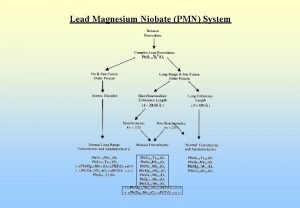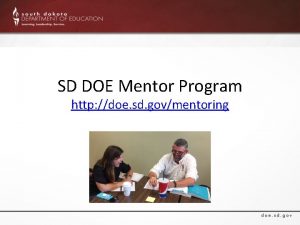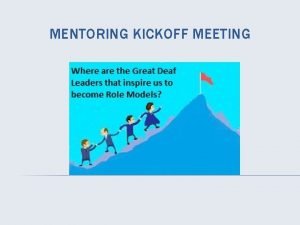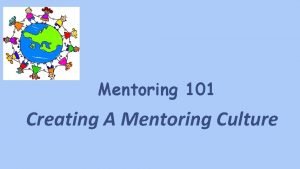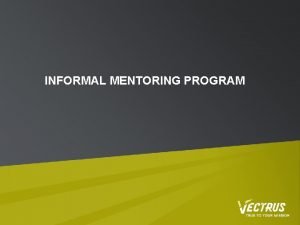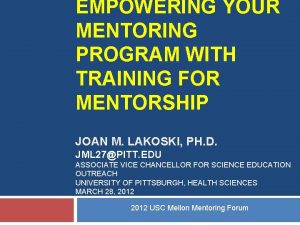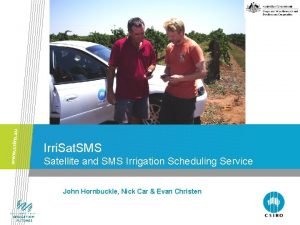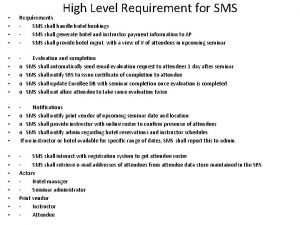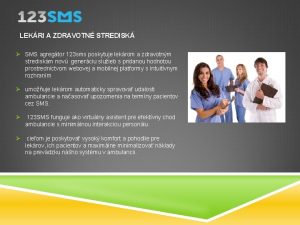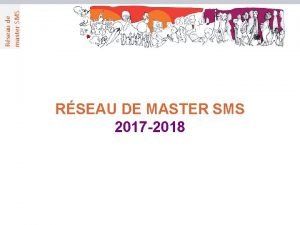Mentor Training New SMs Kate Hamer Lead in





























- Slides: 29

Mentor Training – New SMs Kate Hamer (Lead in mentoring Secondary ITE) Lindsay James (Caludon Castle school and outstanding subject mentor) A mentor is a suitably-experienced teacher who has formal responsibility to work collaboratively within the ITT partnership to help ensure the trainee receives the highest-quality training”.

Aims To understand the roles and responsibilities of the Warwick Subject Mentor. To explore the ingredients required to be an effective subject mentor. To consider what you want from the mentoring role.

Mentors … What do trainees say about you?

Trainee Mentor Teaching fellow Class teachers Pupils Theory and research Family and friends Professional mentor Reflective practice tutor Fellow trainees School colleagues


Standard 1 - Personal qualities: Establish trusting relationships, modelling high standards of practice, and empathising with the challenges a trainee faces. Standard 2 – Teaching Support: Trainees to develop their teaching practice in order to set high expectations and to meet the needs of all pupils. Standard 3 – Professionalism: Induct the trainee into professional norms and values, helping them to understand the importance of the role and responsibilities of teachers in society. Standard 4 – Self-development: Working in partnership to continue to develop their own professional knowledge, skills and understanding and invest time in developing a good working relationship within relevant ITT partnerships. Mentors should use the standards to: • understand what is expected of them and see that it is a manageable role; • enable self-evaluation of practice and help identify areas for further improvement; • support the delivery of the training plan; and • induct trainees into the school and the profession

Lindsay James – Caludon Castle

Ingredients of an Expert Mentor Approachable Adaptable Compassionate / Personable A ‘Guide’ Reflective Courageous

However…one size does not fit all!

Case Study A – The ‘Resistant’ One Characteristics • Disengaged during feedback • Agrees with everything you say! • Aggressive questioning • Disinclined to make suggested changes to lesson plans Approach • Encourage self reflection through questioning during feedback. • Give a clear set of targets that are measurable – this means that they have to follow through with actioning them – not just agreeing at the time. • Don’t be scared to have a courageous conversation with them about their attitude – never forget that you are the expert! • Set strict deadlines for suggested changes to be made. • Be a coach – often the resister will need to be ‘coached’ into a different way of thinking – be patient: they will have an opinion that they need to voice – listen to it, acknowledge it and guide them to alternative points of view.

Case Study B – The ‘Disorganised’ One Characteristics • Flustered • Agrees to everything…good intentions • Often misses a deadline • Doesn’t make notes • Messy! • Always in a rush when there has been plenty of time. Approach • Start small – can you help them create a systematic approach towards their training year. • Don’t let them take on too much – ensure that they are on top of their workload before they take on additional tasks. • Put the emphasis on them to make notes during mentor meetings / feedback – this way they have no excuse forgetting anything. • Give them an area to keep their belongings/paperwork in - it is their responsibility to keep this area tidy. • Set strict time boundaries – i. e. if they have a lesson after lunch, set an expectation of what time you want them to go to the classroom.

Case Study C – The ‘Needy’ One Characteristics Approach • Need for constant reassurance • ‘flitting’ about • Emails out of work hours • Unable to find positives in their lessons • Asking for additional mentor meetings • Demonstrate that you are compassionate person and be willing to reassure them. They will need this when they are in their survival stage! • At the same time, they need boundaries…we are all busy – you need to ensure that you look after yourself as well as time. Have set time slots to see them in during school hours and limit the hours you are willing to communicate with them in the evening/weekend. • Have feedback rules – they have to come up with at least one ‘what went well’ and one ‘even better if’. Start small and build them up – they will soon be recognising their strengths and growing in confidence.

Case Study D – The ‘Laid Back’ One Characteristics • Outwardly calm • Leaves tasks to the last minute • Slow to implement suggested changes • Can sometimes struggle with behaviour Approach • Short regular check in’s to make sure that they are update with their tasks throughout the week. • ‘Triangulate’ with them – ensure you are on top of all of their university tasks and deadlines and make they are building in time to complete them on top of their school commitments. • Short deadlines – if changes need to be made then make sure they have to send them back to you quickly i. e 24 hour turnaround • Make sure that they are aware of school expectations for behaviour. If the ‘laid back’ attitude creeps into the classroom then it can lead to lesson disruption. Support them to have structures in place.

Of course, you could end up with an amalgamation of them all… And you might just need to mix up the layers of your cake! Contact: stjamesl@caludoncastle. co. uk

Stages of training matched to stages of learning Helps to explain the trainee’s actions and reactions Maturity Renewal Consolidation Survival Awareness of these stages of development means support is appropriate and beneficial to the trainee

Role of the Subject mentor Expectations of the role Induct trainee into the department, including departmental resources/exam specs/SEN/grpings etc. Explain whole school and departmental policies including behaviour and improvement plan Provide a balanced timetable Complete a weekly formal observation using the LOP followed by a POD Complete a one hour weekly trainee-mentor meeting aligned on the timetable. – trainee completes the form for this. Maintain a training record across the placement Complete all assessment points using the WADs – 5 across the year. Liaise with the complementary(SD) or second placement(core) subject mentor for a smooth transition Not expected of the role That trainees will replicate the job you do Take on a tutor group Do a daily/weekly duty Do all your marking for you Write school reports Respond to emails late a night (for the next day)

Provide a balanced timetable Autumn term 1 Base School (SD)/PP 1 (Core) Summer term 2 Summer term 1 Spring term 2 Spring term 1 Base School (SD)/PP 1 (Core) Autumn term 2 Half Term Where placement takes place % of 4 days teaching Observations and targeted reflections, some small group teaching or team teaching. No of lessons based on 5 lessons per day 13 Up to 70% of a teacher’s timetable Complementary Placement/PP 2 Teaching Up to 40% of a teacher’s timetable Observations and targeted reflections, some teaching or team teaching. Up to 70% (comprising 40% teaching) Base School (SD) PP 2 (Core) Observations and targeted reflections, some teaching or team teaching. Up to 60% of a teacher’s timetable Up to 70% Base School (SD) Up to 70% PP 2 (Core) Up to 90% (SDS)* Of 13 the trainee teaches 7 7 7 Of 13 the trainee teaches 11 11 13 13 16 Of 13 the trainee teaches 13 * There is no provision at Warwick on Fridays for the last half term, so trainees are in school 5 days a week.

Key role is subject development Knowledge and pedagogy Complete a weekly formal observation using the LOP followed by a POD

Complete a one hour weekly trainee-mentor meeting aligned on the timetable. trainee completes the form for this. This is the opportunity to reflect: “Unless teachers develop the practice of critical reflection, they stay trapped in unexamined judgments, interpretations, assumptions, and expectations. (Larrivee, 2000). Reflective practice module

Training Record (School) For every Trainee, the School must maintain a training folder or file (electronic), in which are stored the following documents: 1. 2. 3. 4. 5. 6. 7. Copies of any prior assessments e. g. AP forms A copy of the trainee’s timetable Copies of the day by day timetable, observations, pupil tracking, meetings, opportunities to review progress Copies of all lesson observations made by Mentors and University Teaching Fellows Copies of the log of Weekly Mentor-Trainee Meetings Copies of correspondence and memoranda relating to the Trainee Access to Trainee’s PDP (invited by trainee – share secret URL) Maintain a training record across the placement

USING THE WADS Tracking and Developing Progress There are five main assessment points during the year, when trainee progress is monitored and targets are set. The main details are as follows:

CTE’s Online Resource https: //warwick. ac. uk/fac/soc/cte/students-partners/pintra/secondary/

Podcast to take you through the paperwork

What do you hope to get from being a mentor?

A mediocre mentor gives feedback A good mentor creates dialogue A great mentor facilitates a learning conversation S Walton, Head of Warwickshire School Improvement Services uses the term “coaching with edge” (Beere, 2013) to describe a conversation containing critical challenge which promotes honest self-reflection

Socrates was an exponent of deep questioning, and critical debate. Applying this principle to coaching where the coach is truly curious and does not already know the answer has been shown to provide superlative results (Bell, 2013) Successful coaching extracts the best out of individuals on both sides of the dialogue (Gallwey, 2009) and therefore results in reciprocal benefit (Cohen, 2011). Mentoring as a broad concept is changing, and is increasingly being ‘associated with collaboration. . . working together and not just working with’ Lofthouse 2015 “owning the change” is the most important hallmark for the [train]ee (Garver, 2008)

Encourage experimentation and creativity Like success, failure is many things to many people. With Positive Mental Attitude, failure is a learning experience, a rung on the ladder, a plateau at which to get your thoughts in order and prepare to try again. ’ W. Clement Stone. Some models have moved beyond goal-setting and focus upon experiencing the richness of learning that comes from experimenting, reflecting and analysing (Megginson, 2012)

Mentoring at its best ………. . ……is about becoming open to possibilities and perspectives by critically reflecting on one’s experiences together Transformational learning

Thankyou for choosing to be a mentor Any questions: kate. hamer@warwick. ac. uk
 C# bramka sms
C# bramka sms Daytoro
Daytoro Kate del castillo kate trillo del castillo
Kate del castillo kate trillo del castillo Kate kate 540
Kate kate 540 Zeko zeko gledaj gle
Zeko zeko gledaj gle Wayne hamer
Wayne hamer Cómo murio el dr hamer?
Cómo murio el dr hamer? Rode hamer psychologische test
Rode hamer psychologische test Fannie lou hamer delta sigma theta
Fannie lou hamer delta sigma theta Fannie lou hamer apush
Fannie lou hamer apush Hvala na pažnji
Hvala na pažnji Vagotonia hamer
Vagotonia hamer Docteur hamer tableau
Docteur hamer tableau Fannie mae hamer
Fannie mae hamer Hamer rodriguez
Hamer rodriguez Dr ryke geerd hamer
Dr ryke geerd hamer Frequency dependence of dielectric constant
Frequency dependence of dielectric constant Old beliefs do not lead you to new cheese meaning
Old beliefs do not lead you to new cheese meaning Eagle court of honor scoutmaster minute
Eagle court of honor scoutmaster minute Sd doe
Sd doe Mentor responsibilities
Mentor responsibilities Mentor responsibilities
Mentor responsibilities Mentor mentee meeting agenda
Mentor mentee meeting agenda Mentor versus sponsor
Mentor versus sponsor Thank you letter mentor
Thank you letter mentor Mentor homme
Mentor homme Mulan refusal of the call
Mulan refusal of the call Mentor responsibilities
Mentor responsibilities Maiden archetype examples
Maiden archetype examples Mentor and mentee roles and responsibilities
Mentor and mentee roles and responsibilities
















